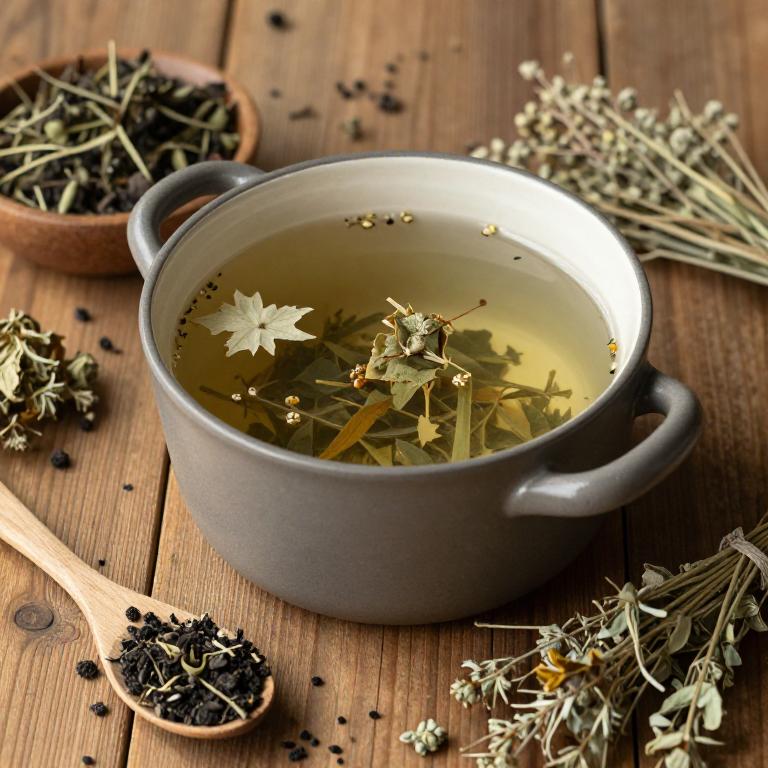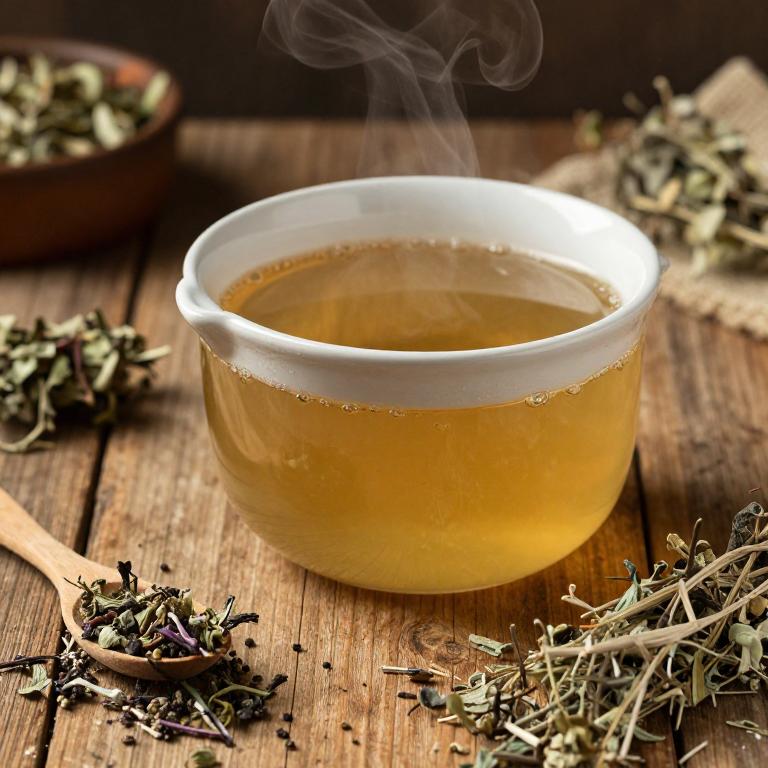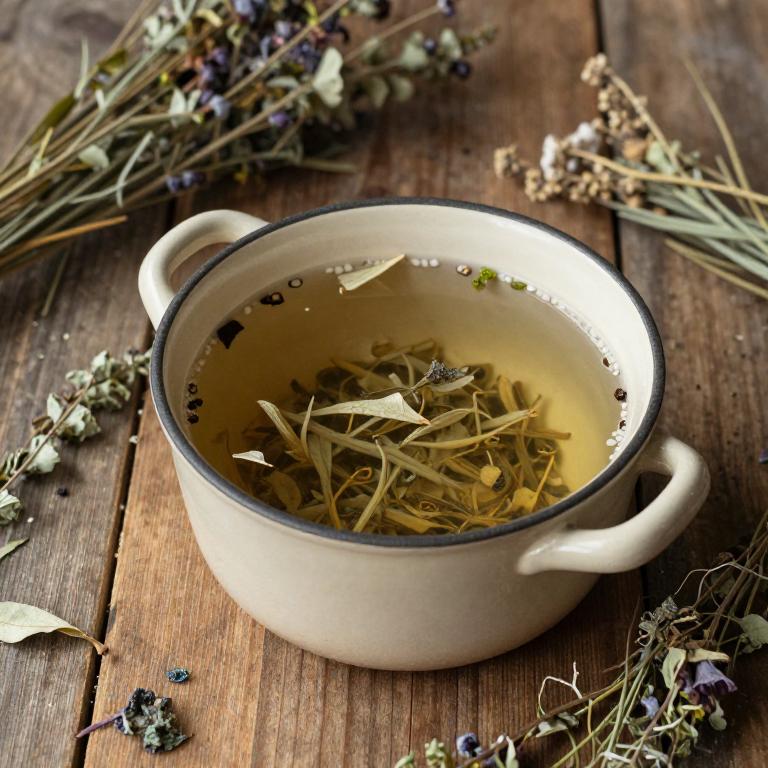10 Best Herbal Decoctions For Gout

Herbal decoctions have been traditionally used to manage gout by reducing uric acid levels and inflammation in the body.
Commonly used herbs include nettle, dandelion, and ginger, which are believed to support kidney function and promote the excretion of uric acid. These decoctions are typically prepared by boiling the dried herbs in water for an extended period to extract their active compounds. While some studies suggest potential benefits, it is important to consult a healthcare professional before using herbal treatments, as they may interact with medications or have side effects.
Overall, herbal decoctions can be a complementary approach to conventional gout management when used responsibly.
Table of Contents
- 1. Common grape (Vitis vinifera)
- 2. Stinging nettle (Urtica dioica)
- 3. Blessed thistle (Cnicus benedictus)
- 4. Ginger (Zingiber officinale)
- 5. Turmeric (Curcuma longa)
- 6. Indian barberry (Berberis aristata)
- 7. Field horsetail (Equisetum arvense)
- 8. Rhubarb (Rheum palmatum)
- 9. Black pepper (Piper nigrum)
- 10. Yarrow (Achillea millefolium)
1. Common grape (Vitis vinifera)

Vitis vinifera, commonly known as the grapevine, has been traditionally used in herbal medicine for its potential anti-inflammatory and antioxidant properties.
Herbal decoctions made from the leaves and roots of Vitis vinifera are believed to support joint health and may help reduce uric acid levels, which are a primary contributor to gout. These decoctions are often prepared by simmering the plant material in water for an extended period to extract beneficial compounds such as resveratrol and flavonoids. While some studies suggest that Vitis vinifera may offer complementary benefits for gout management, it is important to consult a healthcare professional before using these remedies as part of a treatment plan.
As with any herbal treatment, individual responses can vary, and it should not replace conventional medical care for gout.
2. Stinging nettle (Urtica dioica)

Urtica dioica, commonly known as stinging nettle, has been traditionally used in herbal medicine for its potential anti-inflammatory and diuretic properties, which may benefit individuals with gout.
A decoction of stinging nettle involves simmering the dried or fresh leaves in water to extract its active compounds, including compounds like flavonoids and lignans that are believed to reduce uric acid levels in the body. While some studies suggest that nettle may help lower uric acid and alleviate gout symptoms, it is important to note that it should not replace conventional medical treatments for gout.
Herbal decoctions should be prepared and consumed under the guidance of a qualified healthcare provider to ensure safety and efficacy, especially for those with existing health conditions or taking medications.
3. Blessed thistle (Cnicus benedictus)

Cnicus benedictus, commonly known as blessed thistle, has been traditionally used in herbal medicine for its potential anti-inflammatory and detoxifying properties.
While it is not a primary treatment for gout, some herbalists suggest that its mild diuretic and liver-supporting effects may aid in the management of gout symptoms by promoting the elimination of uric acid. Herbal decoctions made from Cnicus benedictus typically involve simmering the dried leaves and stems in water for several hours to extract the active compounds. However, it is important to note that scientific evidence supporting its efficacy for gout is limited, and it should not replace conventional medical treatments.
Individuals considering its use should consult with a healthcare professional to ensure safety and appropriateness for their specific condition.
4. Ginger (Zingiber officinale)

Zingiber officinale, commonly known as ginger, has been traditionally used in herbal medicine for its anti-inflammatory and analgesic properties.
Herbal decoctions made from fresh or dried ginger root are often prepared by simmering the rhizome in water to extract its active compounds, such as gingerol and shogaol. These compounds are believed to help reduce uric acid levels and alleviate gout-related inflammation and pain. Studies suggest that ginger may support joint health and reduce oxidative stress, which are key factors in gout management.
However, while ginger is generally safe, it should be used cautiously and in consultation with a healthcare provider, especially for individuals with digestive sensitivities or those on medication.
5. Turmeric (Curcuma longa)

Curcuma longa, commonly known as turmeric, has been traditionally used in herbal medicine for its anti-inflammatory and antioxidant properties.
Herbal decoctions made from Curcuma longa are often prepared by simmering the rhizome in water to extract its active compounds, particularly curcumin. These decoctions may help reduce uric acid levels and alleviate pain and inflammation associated with gout. However, while some studies suggest potential benefits, more clinical research is needed to confirm their efficacy and safety for gout management.
As with any herbal remedy, it is advisable to consult a healthcare professional before using Curcuma longa decoctions as part of a treatment plan for gout.
6. Indian barberry (Berberis aristata)

Berberis aristata, also known as Indian barberry, contains berberine, a bioactive compound with anti-inflammatory and antimicrobial properties.
Herbal decoctions made from Berberis aristata have been traditionally used in Ayurvedic medicine to support joint health and reduce inflammation, making them a potential complementary therapy for gout. The alkaloidal compounds in the decoction may help lower uric acid levels and reduce the formation of urate crystals in the joints. However, while some studies suggest its efficacy, more clinical research is needed to confirm its safety and effectiveness for gout management.
As with any herbal remedy, it is important to consult a healthcare provider before using Berberis aristata decoctions, especially for individuals with existing medical conditions or those taking other medications.
7. Field horsetail (Equisetum arvense)

Equisetum arvense, commonly known as field horsetail, has been traditionally used in herbal medicine for its diuretic and anti-inflammatory properties.
Herbal decoctions made from the dried stems of Equisetum arvense are believed to help reduce uric acid levels in the body, which can alleviate symptoms of gout. The high concentration of silica and other minerals in the plant may contribute to its effectiveness in supporting joint health and reducing inflammation. However, while some studies suggest potential benefits, more research is needed to confirm its efficacy and safety for gout treatment.
It is important to consult a healthcare professional before using Equisetum arvense as a complementary therapy for gout.
8. Rhubarb (Rheum palmatum)

Rheum palmatum, also known as Chinese rhubarb, has been traditionally used in herbal medicine for its potent anti-inflammatory and detoxifying properties.
When prepared as a decoction, it is often employed to support the treatment of gout by helping to eliminate uric acid buildup from the body. The active compounds in Rheum palmatum, such as anthraquinones, may help reduce inflammation and pain associated with gouty arthritis. However, due to its strong laxative effects, it should be used with caution and under the guidance of a qualified herbalist or healthcare provider.
While some studies suggest potential benefits, more research is needed to fully understand its efficacy and safety in managing gout symptoms.
9. Black pepper (Piper nigrum)

Piper nigrum, commonly known as black pepper, has been traditionally used in herbal medicine for its potential anti-inflammatory and analgesic properties.
When prepared as a decoction, black pepper may help reduce uric acid levels in the body, which is a key factor in the development of gout. The active compound in black pepper, piperine, is believed to enhance the bioavailability of other nutrients and may support the body's natural detoxification processes. However, while some studies suggest that piper nigrum may offer supportive benefits for gout management, it is not a substitute for medical treatment and should be used under the guidance of a healthcare professional.
As with any herbal remedy, individual responses can vary, and it is important to monitor for potential side effects or interactions with other medications.
10. Yarrow (Achillea millefolium)

Achillea millefolium, commonly known as yarrow, has been traditionally used in herbal medicine for its anti-inflammatory and diuretic properties, which may support the management of gout.
Herbal decoctions of yarrow typically involve simmering the dried leaves and flowers in water to extract their active compounds, such as flavonoids and essential oils. These compounds are believed to help reduce uric acid levels and alleviate joint inflammation associated with gout. However, while some anecdotal evidence suggests potential benefits, scientific research on its efficacy for gout is limited.
It is important to consult a healthcare professional before using yarrow or any herbal remedy, as it may interact with medications or have side effects.